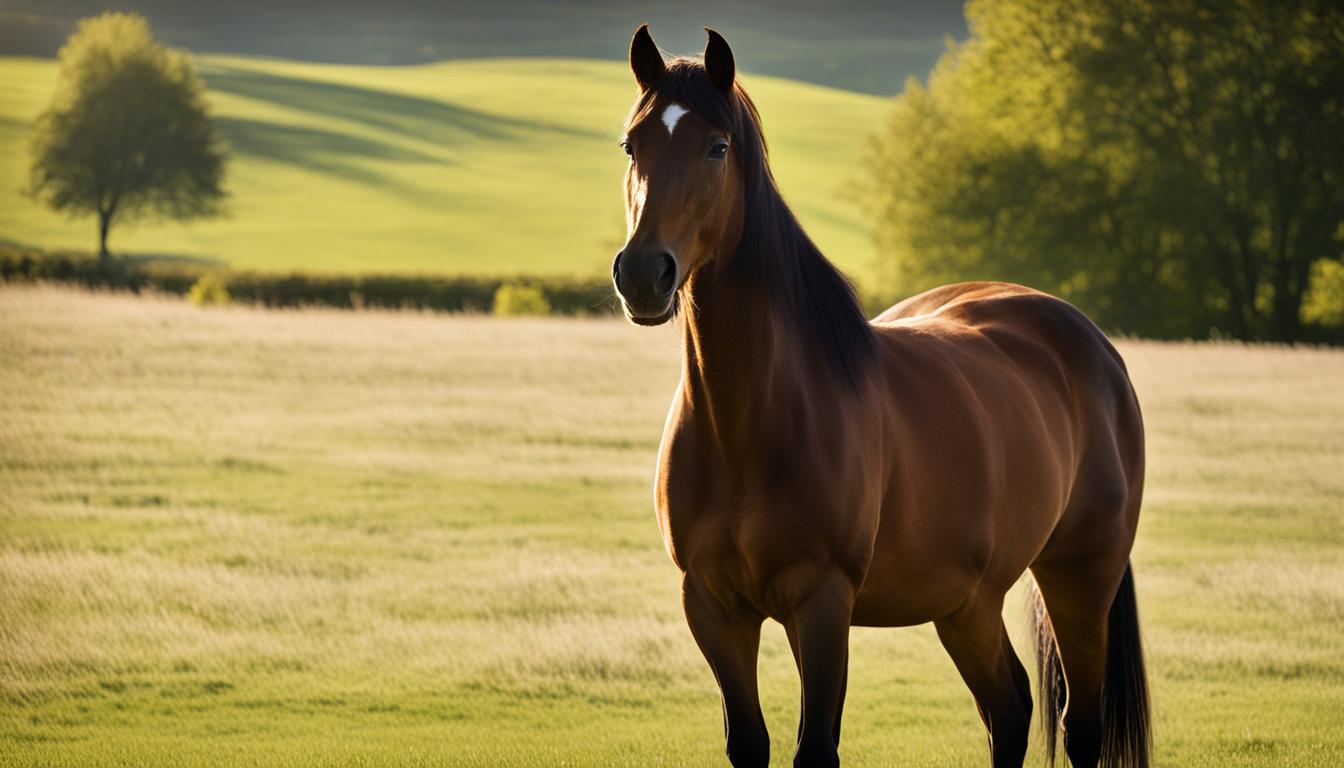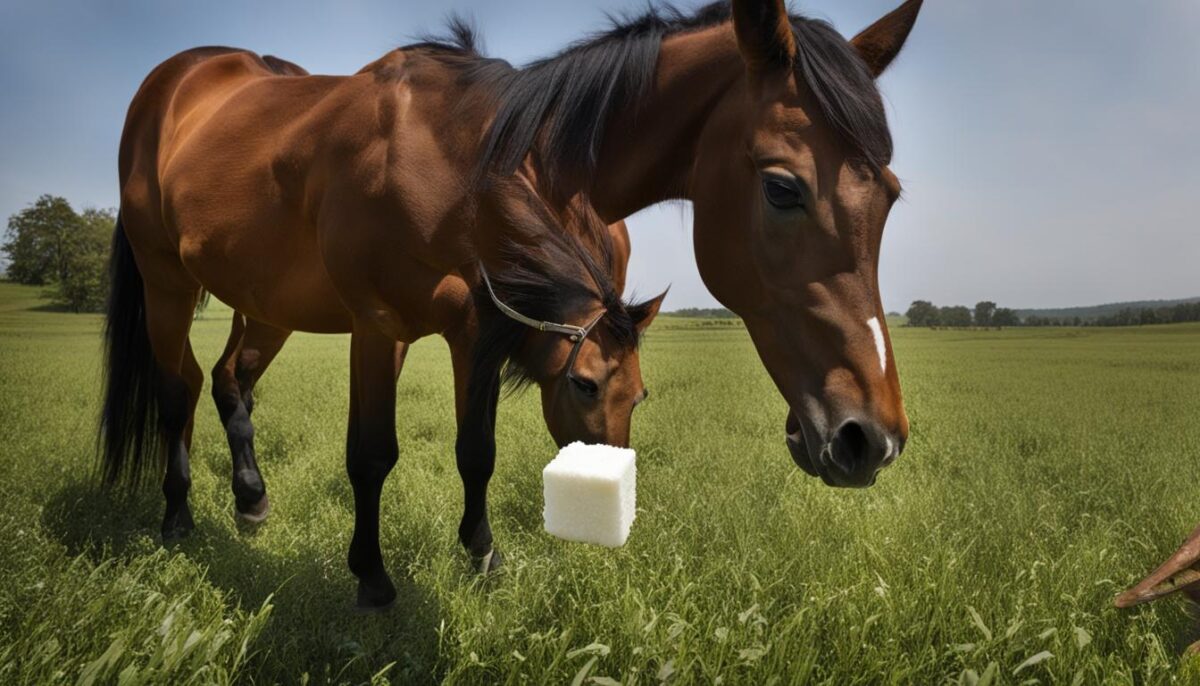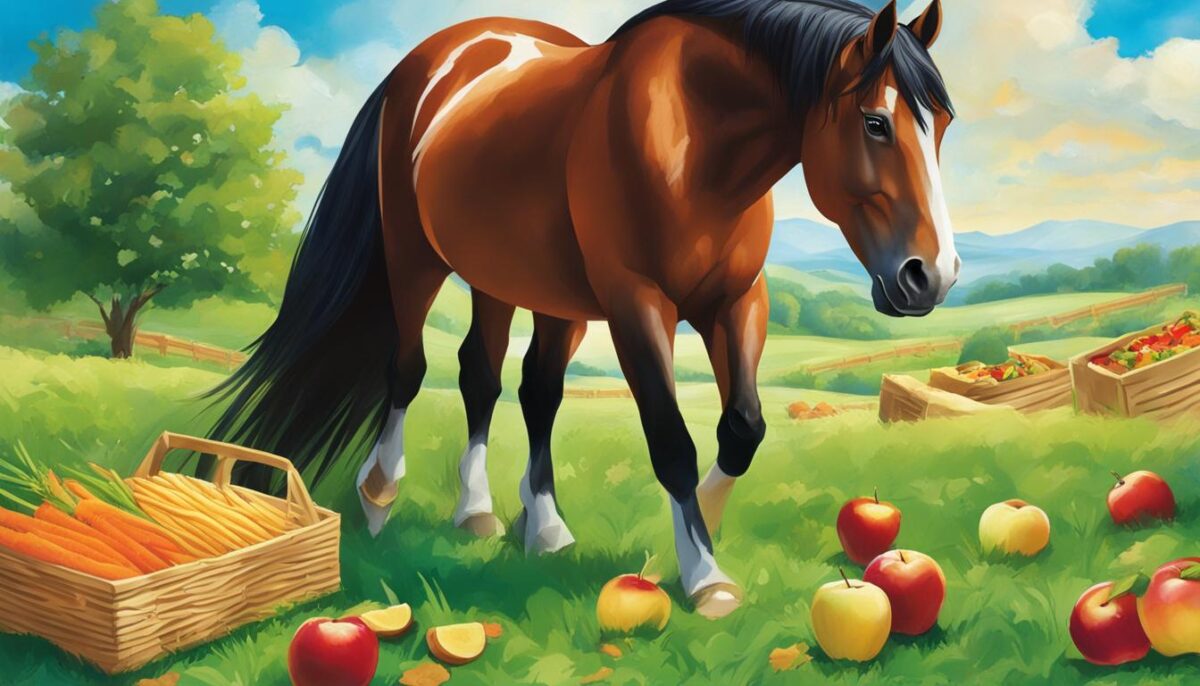If you’re a horse owner, you might wonder if giving your horses sugar cubes or other treats is a good idea. Treats can be a fun reward for good behavior, but it’s important to know how they might impact your horse’s diet and overall equine health. In this article, we’ll explore the role of sugar cubes in your horse’s diet and find out if they’re a safe treat for your trusty steed.
Key Takeaways
- Understanding your horse’s diet and sugar intake is crucial.
- Sugar cubes can be used as treats, but should be given sparingly.
- Excessive sugar can lead to negative behaviors and health risks.
- Alternative treats and rewards can help maintain a balanced diet.
- Always use treats responsibly and be aware of your horse’s needs.
Understanding Your Horse’s Diet and Sugar Intake
Grass and forage are major sources of sugar in a horse’s diet, providing them with energy and meeting their nutritional needs. However, factors like time of day, season, and climate can affect the sugar levels in forage. It’s essential to understand your horse’s dietary requirements and monitor their sugar intake to ensure their health and well-being.
Assessing Forage: The Main Source of Equine Sugar
Horse forage sugar levels vary based on the time of day, with sugar content typically highest in the afternoon. For horses at risk of conditions like laminitis, it’s advised to turn them out at night and bring them in by mid-morning. The sugar present in growing grass, such as glucose, sucrose, and fructose, can decrease when it’s baled as hay.
Navigating the Nutritional Needs of Different Horse Breeds
Each horse has unique nutritional needs based on factors like weight, health status, and susceptibility to conditions like insulin dysregulation or laminitis. Some horses may require a diet with less than 12% non-structural carbohydrate (NSC), limiting their consumption of pasture and necessitating mature, fibrous forage. Proper forage selection is crucial for horses prone to laminitis, and analyzing forage sugar levels can aid in choosing the right food.
Understanding water soluble carbohydrates and non-structural carbohydrates in your horse’s diet is essential to meet their nutritional needs and accommodate horse breeds with specific dietary requirements. By carefully monitoring their sugar intake and providing the appropriate forage, you can ensure your horse remains healthy and maintains optimal performance.
Can Horses Eat Sugar Cubes: Unwrapping the Sweet Truth
Feeding horses sugar cubes is a common reward practice for desired behaviors. While horses may enjoy sugary treats like equine sugar treats, it’s vital to balance their diet, avoid overfeeding and maintain discipline without relying on treats as a primary incentive.
Rewards should be offered on the trainer’s terms and not let the horse demand them. Sugar cubes for horses should be given sparingly to prevent the development of undesirable behaviors and health risks. As a horse owner, it is crucial to find a balance between rewarding your horse and ensuring optimal horse training.
Here are some suggestions to minimize the risks:
- Choose to provide small, bite-sized pieces of sugar cubes.
- Offer sugar cubes or other treats after the riding or training session, not during.
- Limit the days in a week you give sugar cubes to your horse.
- Monitor the horse’s behavior and adjust the use of treats as necessary.
While safe horse treats can be an enticing and motivating incentive for your horse, remember that moderation is key. Incorporating other positive reinforcement techniques, such as verbal praise and physical affection, can also help build a strong bond with your horse and contribute to successful training sessions.
The Effects of Sugar on Equine Health and Behavior
Understanding the impact of sugar on your horse’s health and behavior is essential for effective horse dietary management. While treats like sugar cubes have the potential to positively influence food-motivated behaviors, excessive intake could lead to equine health risks. Let’s examine how sugar influences a horse’s conduct and explore preventative measures to mitigate health risks associated with excessive sugar consumption.
Observing How Sugar Influences Your Horse’s Conduct
Many horses are food-motivated, which means they may respond well to treats such as sugar cubes. These rewards can lead to a more positive attitude in your horse when given in moderation. However, they may also cause the development of problematic habits, like turning around for a treat during rides. It’s essential to maintain control over the rewarding process to ensure that treats do not become a distraction or result in the horse expecting rewards without following commands properly.
Mitigating Health Risks Associated with Excessive Sugar
Although sugar can act as a motivator for your horse, its excessive intake can cause several health problems. Issues such as digestive upset, colic, and laminitis may result from a diet high in sugar. Balancing forage and concentrate intake can help prevent overconsumption of starches and sugars, which in turn alleviates stress on the digestive tract. It is particularly important to limit starch and sugar intake for sensitive horses to maintain their overall health and prevent complications arising from high sugar levels.
In conclusion, it’s crucial to observe how sugar influences your horse’s behavior and take steps to avoid the potential equine health risks associated with excessive sugar in their diet. Moderation and mindful dietary management can make a significant difference in maintaining your horse’s health and preventing undesirable behaviors.
Alternative Treats and Rewards: Healthy Options for Your Horse
While sugar cubes can be a quick and easy treat for your horse, there are plenty of healthier equine safe treats available. In this section, we’ll explore some horse friendly fruits and vegetables, as well as other methods of behavior reinforcement without relying solely on sugary rewards.
Identifying Equine Safe Vegetables and Fruits
There is a wide variety of safe, horse healthy snacks that can be used as alternative treats without the added sugar. Here are some of the most popular options:
- Carrot coins
- Apple slices
- Pear slices
- Bananas
- Watermelon
- Grapes
Remember to always remove any seeds or pits before feeding fruits to your horse. If your horse has dietary sensitivities, mint-flavored TUMS can be a stomach-friendly option.
Implementing Effective Training Rewards Beyond Sugar Cubes
Training rewards aren’t limited to just food treats. You can utilize a variety of non-food rewards as a means for behavior reinforcement while maintaining discipline and preventing the development of negative behaviors linked to treat expectations. Some alternative horse training rewards include:
- Physical affection, such as scratches on the wither or patting
- Verbal praise
- Clicker training
- Access to a preferred grazing spot
By incorporating a mix of non-sugary treats for horses and attention-based rewards, you can create a well-rounded and positive training experience for both you and your horse.
Conclusion
When it comes to horse treat safety, it’s essential to be mindful of the impacts of sugary treats like sugar cubes on your horse’s health and behavior. By rewarding horses responsibly, you not only encourage positive actions but also safeguard their well-being. Following established equine treat guidelines ensures that your horse enjoys a balanced diet and a well-rounded training experience.
Moderation and responsible feeding practices play crucial roles in preventing negative behaviors and health risks. These include offering a variety of rewards that meet your horse’s dietary needs. As a responsible horse owner, you should always be aware of how your choices can influence their behavior and health.
In conclusion, maintaining a balanced approach to rewarding and treating your horses will lead to a well-trained and healthy companion. By incorporating various reward methods, understanding your equine partner’s nutritional requirements, and being diligent in managing treat-induced behaviors, you can foster a positive and fulfilling relationship with your horse.
FAQ
Is it safe to feed horses sugar cubes as a treat?
Feeding horses sugar cubes in moderation is generally safe, but it’s important to avoid overfeeding and ensuring treats don’t negatively impact the horse’s work ethic or health. Consider alternative treats and rewards as well to maintain a balanced diet and avoid health issues related to excessive sugar consumption.
What are the main sources of sugar in a horse’s diet?
Grass and forage are the primary sources of sugar in a horse’s diet. The sugar content in forage can be influenced by factors such as time of day, season, and climate. The sugar levels in growing grass can also decrease when it’s baled as hay.
How much sugar is safe for my horse?
The amount of sugar a horse can safely consume depends on factors like weight, health status, and whether it’s prone to conditions like insulin dysregulation or laminitis. Some horses may require a diet with less than 12% non-structural carbohydrates (NSC), limiting their consumption of pasture and requiring mature, fibrous forage. Analysing forage sugar levels can aid in selecting the right food for your horse.
Can sugar cubes affect a horse’s behavior?
Horses that are food-motivated may display a more positive attitude when rewarded with sugar cubes. However, they can develop habits like turning around for a treat during rides, which can be problematic. It’s essential to maintain control and ensure that treats do not become a distraction or lead to issues like the horse expecting rewards without respecting commands.
What are the health risks associated with excessive sugar intake for horses?
Excessive sugar intake can lead to health problems like digestive upset, colic, and laminitis. A balance between forage and concentrate intake can prevent overconsumption of starches/sugars, which puts stress on the digestive tract. Limiting starch and sugar intake, especially for sensitive horses, is key to maintaining overall health and preventing conditions related to high sugar levels.
What alternative treats and rewards can I use for my horse?
Besides sugar cubes, vegetables, and fruits safe for horses can be an excellent alternative treat option. Fruits like carrot coins are a good choice, and mint-flavored TUMS can be stomach-friendly for horses with dietary sensitivities. Physical affection (scratches on the wither) and verbal praise are also effective training rewards that can reinforce positive behavior without relying on sugary treats.


